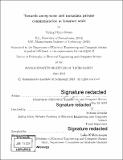Towards anonymous and metadata private communication at Internet scale
Author(s)
Kwon, Young Hyun.
Download1122780065-MIT.pdf (13.24Mb)
Other Contributors
Massachusetts Institute of Technology. Department of Electrical Engineering and Computer Science.
Advisor
Srinivas Devadas.
Terms of use
Metadata
Show full item recordAbstract
As the world becomes more connected, privacy is becoming harder to maintain. From social media services to Internet service providers to state-sponsored mass-surveillance programs, many outlets collect sensitive information about the users and the communication between them - often without the users ever knowing about it. In response, many Internet users have turned to end-to-end encryption, like Signal and TLS, to protect the content of the communication. Unfortunately, these works do little to hide the metadata of the communication, such as when and with whom a user is communicating. In scenarios where the metadata are sensitive, encryption alone is not sufficient to ensure users' privacy. Most prior communication systems that provide metadata privacy fall into one of two categories: (1) systems that provide formal privacy guarantees against global adversaries but do not scale to large numbers of users, or (2) systems that scale easily to a large user base but do not provide strong guarantees against global adversaries. In this thesis, I will present three systems that aim to bridge the gap between the two categories to enable private communication with strong guarantees for many millions of users. First, I will present Atom, a horizontally scalable anonymous broadcast system for short messages that defends against a global adversary who monitors the entire network and controls a significant fraction of the servers while scaling easily by adding more servers to its network. Then, I will present Quark, another horizontally scalable anonymous broadcast system that trades bandwidth for latency to achieve more than an order of magnitude speed-up over Atom under the same threat model. Finally, I will present XRD, which provides metadata private communication between two honest users against the same adversary using a novel cryptographic primitive called aggregate hybrid shuffle.
Description
Thesis: Ph. D., Massachusetts Institute of Technology, Department of Electrical Engineering and Computer Science, 2019 Cataloged from PDF version of thesis. Includes bibliographical references (pages 111-121).
Date issued
2019Department
Massachusetts Institute of Technology. Department of Electrical Engineering and Computer SciencePublisher
Massachusetts Institute of Technology
Keywords
Electrical Engineering and Computer Science.